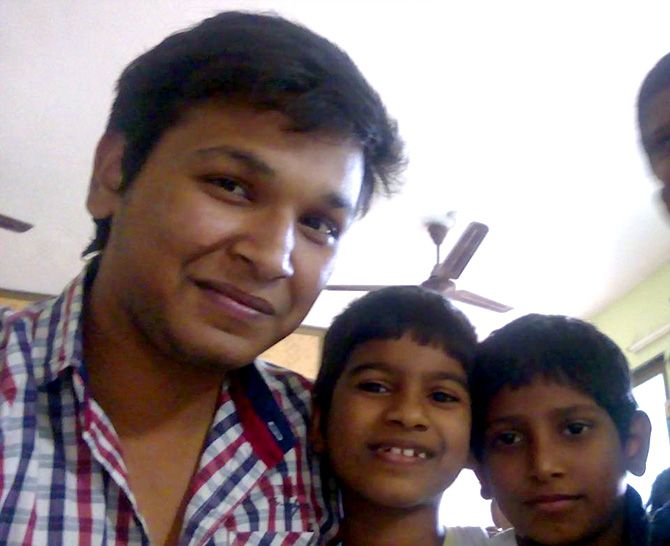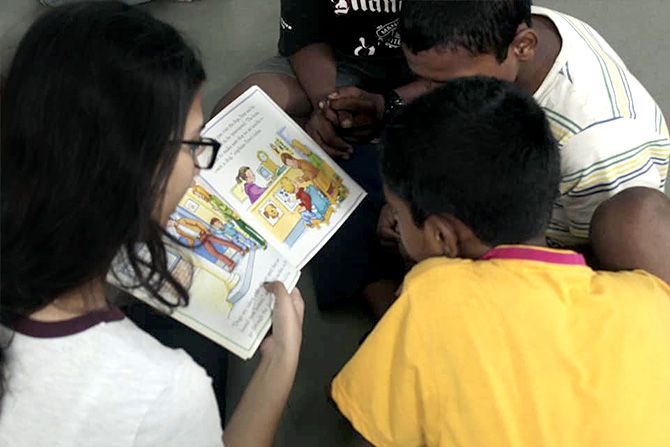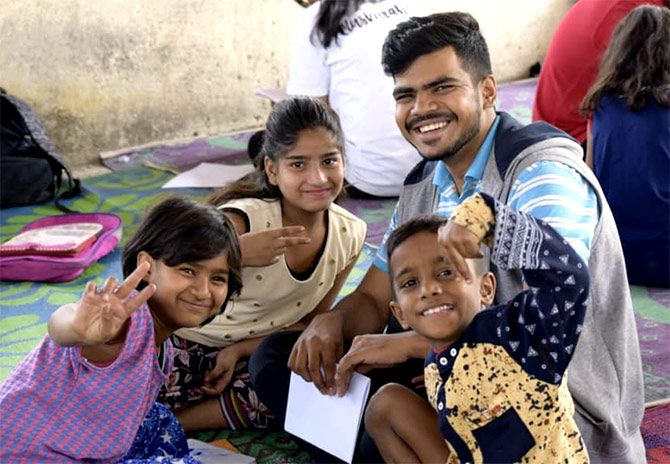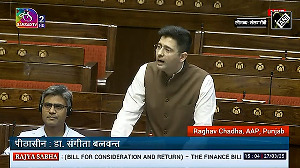'Social work is not about randomly distributing books and food to any poor person you know.'
'Focus on creating a larger space. Be creative and innovative.'
With a small team of like-willed youngsters, Himanshu Goenka is creating opportunities for underprivileged children to dream big.

At the age of 18, some of us are just figuring out what to do with our careers, our lives.
Mumbai-born Himanshu Goenka was 18 when he started Muskurahat, an initiative to bring help the less privileged.
The idea came to him when he was celebrating his 17th birthday at a shelter home away from the city.
"We spent the whole day with the children there; we played games, gave them gifts, etc. It was the happiest day in my life," he tells Divya Nair/Rediff.com
"After the event, the manager of the orphanage revealed that these kids were not orphans, they were juveniles. All the boys had a background in either smuggling, drug abuse, crime, human trafficking or prostitution.
"I was shocked to learn that the kids had faced so many struggles. I decided I would work for them and promised myself that no child would be called 'underprivileged' anymore," the 21-year-old says.
In 2015, Himanshu started Team Muskurahat with a bunch of friends who volunteered to educate and spend time with the less privileged.
In 2016, Muskurahat was registered as a trust. In the three years that followed, Himanshu and his team of volunteers have worked with over 500 kids in Maharashtra and Karnataka.
A graduate in mass media, Himanshu is currently pursuing his MBA even as he continues to nurture his non-profit organisation.
In this interview, he explains how his self-funded team -- without any expectations of rewards or monetary benefits -- is working to change the lives of less privileged children.
Why did you start Muskurahat? What does it do?
We were a group of friends who used to go to shelter homes and orphanages. We worked together from 2014 to 2016 and used to call ourselves Team Muskurahat.
Slowly, I realised social work should not be limited to visiting shelter homes and orphanages; it should be able to create a larger impact on society.
That's why I registered Muskurahat as a non-profit organisation and renamed it the Muskurahat Foundation.
Muskurahat is primarily focused on education beyond academics. We work towards the holistic development of children in shelter homes, orphanages and slums through projects like KEYtaab and Anganwadi.
You had a full-time job and were studying as well. How did you find time for social work?
Right now I am studying but I was working full time for three years and will be working full time after my MBA.
I follow a basic rule: 'If I cannot dedicate my days to Muskurahat, I will work at night. If I don't find time during the weekdays, I will work on weekends.
My strong core team helps me follow my passion in event management; they handle things pretty well in my absence.
How did you build the team? How many volunteers are there currently?
Initially, we were just a group of friends. Then people started joining us due to word-of-mouth publicity.
Muskurahat is open to everyone. We give everybody a chance but only retain those volunteers who perform well.
We have a strong Volunteer Evaluation team.
As of now, we are a team of eight people working full time, 10 'work-from-home' interns and 120 dedicated volunteers.
WATCH! In the video below, Himanshu talks about how he founded the Muskurahat Foundation.
Video: Kind courtesy India's Future Tycoons by ENpower
Do Muskurahat's volunteers get paid?
Our volunteers work for free.
The interns and the full-time employees receive a stipend based on their performance.
Is your work limited to Maharashtra?
We have eight projects in Mumbai that cater to almost 500 children.
We started in Bengaluru too, but it failed after a few months but due to lack of leadership.
We are planning to try again in Bengaluru. We want to expand to Delhi as well.

How did your parents react when you told them about the initiative?
I didn’t tell them about Muskurahat during its first two years. Once the team got better, I invited them to see what I had been doing.
I made a deal with them that Muskurahat will always be my alternate project and I will not let it affect my studies and career.
They immediately supported me and I know that they are very proud of me.
The satisfaction I get every night realising that 500 kids are getting a better life because of me inspires me.
I get the most peaceful sleep. No other experience can beat this.
Which has been your most challenging activity so far?
At Muskurahat, every day is challenging.
We have developed ourselves in such a way that we don’t treat any challenge as a 'challenge'. We treat it as a hurdle -- just jump over it and move on to the next one.
Have you been criticised?
I was criticised when Muskurahat decided we will not work for the victims of the Kerala floods.
People thought it was very inhuman of us.
But Muskurahat believes in working where there is maximum need. The people of Kerala had the whole country working for them.
We realised that our effort wouldn’t have added much value to the larger cause. Hence, we decided to concentrate on a set of beneficiaries who were neglected by society.

Can you share some success stories?
Last year, all the children in the shelter home we were working at passed with more than 70 per cent marks; this happened after we started working with them.
Before that, most of them either failed or had less than 50 per cent marks.
The irony is that we never taught them academics. But our presence and our efforts towards their holistic development made them realise the importance of studies.
They learnt everything without any help.
Your learnings as a social entrepreneur?
I have become a better human being.
I have learned that:
- You are never too young to do social work.
- You don't require to have money to create an impact in someone’s life.
- Stay positive and chase your dreams. Things will fall into place automatically.
According to you, what are some of the problems India has been facing that those living in metros are not aware of?
It's the perception of people towards social work.
For example, a lot of people believe social work can be proved with pictures. And that you can only do social work when you have a lot of money.
Or that you should take up social service only when you are 'settled' in your life.
To start an NGO, you need funding, etc.
At Muskurahat, we strive day and night to bust these myths and perceptions.
What can youngsters do to be a part of social change? Where can they start?
First of all, they should stop treating social work as a way to gather fame or external validation.
If you are doing social work, do it quietly. There is no need to tell the world about it.
Social work is not about randomly distributing books and food to any poor person you know.
Invest thought before you start. Once you start doing it, I am sure you will excel as a person.
Focus on creating a larger space. Be creative and innovative.
What's your big dream?
My goal is to improve the way management and entrepreneurship is taught to students. I feel it should be taught at the school level itself.
Your message to our readers?
Just believe in what you want to do. It’s okay to not have a plan. But channelise yourself in the right way.
Don’t just see dreams, chase them.
Don’t wait for the right opportunity. The right moment is the moment you have an idea.












 © 2025
© 2025